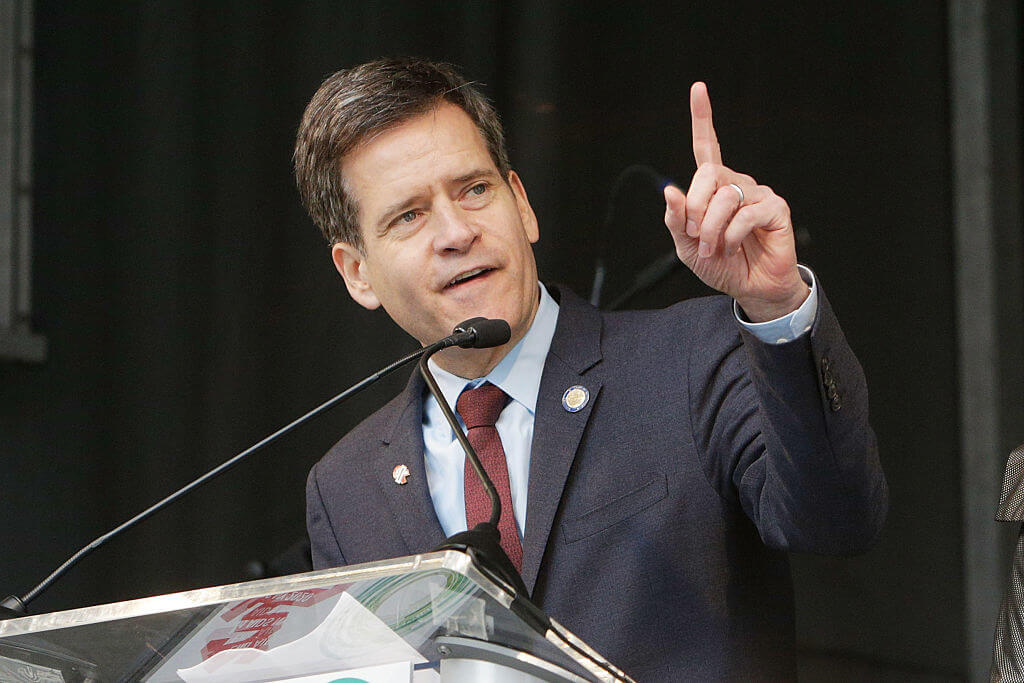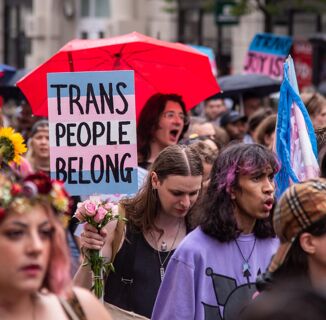At least four states are positioned to ban conversion therapy following the “blue wave” in Tuesday’s midterms. Three of them—Colorado, Maine, and New York—now boast Democratic “trifectas” after liberals made historic gains in municipalities across the United States.
Colorado and New York both flipped their State Senates, which had proven major obstacles to passing legislation outlawing the discredited “gay cure” treatment.
Although New York technically held a Democratic majority in the upper house of its legislature already, a group of rogue liberals broke with their party to caucus with the Republicans. Democrats needed to win just one additional seat to neutralize that coalition.
Next year, Democratic lawmakers will control at least 35 of 63 seats in the New York Senate.
Prior to the Nov. 6 vote, openly gay Sen. Brad Hoylman told INTO that ending the Senate logjam was crucial to passing a conversion therapy ban in Albany, as well enacting a comprehensive trans rights bill.
“The Republican Party, which controls the State Senate, has blocked every piece of LGBTQ legislation since 2011,” he claimed.
“We’ve seen the Republicans are unmovable on this issue,” Hoylman added during the Oct. 23 phone call. “There is no doubt that the Republican Senate will continue to block LGBTQ rights. The only hope for our community is a political change in the State Senate.”
Although New York State Assembly approved a bill in 2018 prohibiting the discredited medical practice from being performed on LGBTQ minors, Republicans won’t allow a vote on the measure in the Senate.
Gov. Andrew Cuomo, who handily won reelection in a 32-point landslide, signed an executive order in February 2016 restricting insurance providers from covering therapists who claim to be able to “change” the orientation of LGBTQ youth. But advocates say that order, while welcome, was largely symbolic.
Democratic control of the New York House and Senate will allow the state to go further, likely joining the list of 14 states which have taken comprehensive action to ban conversion therapy.
These states include California, Illinois, New Hampshire, New Mexico, and Nevada, as well as the District of Columbia.
“In my opinion, I think there are changes in the wind,” Hoylman predicted. “We saw it in the primaries here in the state. We had record turnout on the part of Democrats, and we’ve seen a lot of Republicans who understand that their party doesn’t represent them any longer.”
Colorado could be headed down a similar path.
In addition to Jared Polis’ election as the first gay man to serve as governor in the U.S., its Senate also turned blue on Tuesday. After winning two seats in the 2018 midterms, Democrats now claim a 19-16 majority. Republicans previously held a one-vote advantage in the upper house of the state legislature.
Colorado Democrats wasted no time in celebrating victory. The party already elected its new Senate President on Thursday, with Sen. Leroy Garcia assuming leadership.
The liberal gains in the Colorado General Assembly are a boon to advocates who have been trying to pass a conversion therapy ban in the state for years. In April 2018, Republicans in the Senate sent HB18-1245—which would have barred orientation change efforts from being performed on minors—to the State, Veterans, & Military Affairs committee.
Also known as a “kill committee,” that move kept the proposal from being debated on the Senate floor. This is despite the fact that HB18-1245 had already been approved by the Colorado House of Representatives.
While the Senate also flipped to Democrats in Maine, its GOP-controlled upper house had already passed a similar bill—one of several conservative-majority legislative bodies to do so. But despite widespread bipartisan approval, Republican Gov. Paul LePage became the first U.S. governor to veto a conversion therapy bill.
LePage, though, was term-limited from seeking reelection. On Tuesday, Janet Mills, a Democrat, defeated Republican Shawn Moody by 7.6 points to replace the extremely unpopular governor.
During the election, Mills vowed to sign a conversion therapy ban if voted into office.
“Conversion therapy is a pseudoscientific process premised on the repugnant idea that being gay, lesbian, bisexual or transgender is a disease that must be ‘cured,’” she said in a March statement. “This barbaric practice has been proven to place LGBTQ children and teenagers at an increased risk for depression, anxiety, drug use, homelessness, and suicide.”
“LGBTQ people don’t need to be ‘fixed,’” Mills added. “As governor, I will make sure LGBTQ young people in Maine hear from their political leaders that they are respected and valued, not broken.”
There’s one more state which advocates believe could be prepared to ban conversion therapy in 2019: Massachusetts.
While the state’s reelected Republican governor, Charlie Baker, kept the liberal stronghold from joining the list of states with Democratic trifectas, the Massachusetts Legislature came extremely close to passing a statewide prohibition on orientation change efforts last year.
A conversion therapy bill was widely supported by both the House and Senate, but the two chambers failed to reconcile differences in their versions of the legislation before the lawmaking body wrapped for the year.
The proposal is likely to be reconsidered in 2019.
Sam Brinton, head of advocacy and government affairs for the Trevor Project, believes it could pass. Brinton (who uses gender-neutral pronouns) said the election of more than 157 openly LGBTQ politicians in 2018 shows change is coming.
“We will not pass legislation banning conversion therapy in fell swoop, but the rainbow wave has given us momentum so that 2019 could be one of the most successful years in passing these really important protections,” they told INTO in a phone conversation. “Having a voice consistently in the halls is going to make a big, big difference.”
In addition to the states listed above, Brinton cited the election of openly LGBTQ legislators like J.D. Ford in Indiana and Neil Rafferty in Alabama as laying the groundwork to ban conversion therapy in all 50 states—even unlikely ones.
Next year, Brinton claimed advocates would be pushing more pieces of legislation to outlaw the practice in more states than ever before in history.
“Every state deserves to have the conversation,” they said.
Help make sure LGBTQ+ stories are being told...
We can't rely on mainstream media to tell our stories. That's why we don't lock our articles behind a paywall. Will you support our mission with a contribution today?
Cancel anytime · Proudly LGBTQ+ owned and operated
Read More in Impact
The Latest on INTO
Subscribe to get a twice-weekly dose of queer news, updates, and insights from the INTO team.
in Your Inbox













